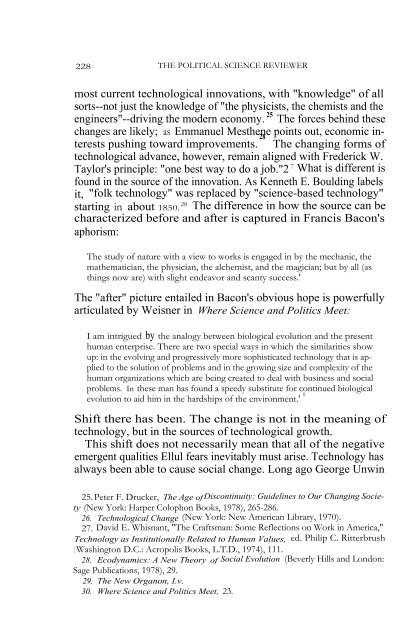Jacques Ellul- Prophetic or Apocalyptic Theologian of Technology?*
Jacques Ellul- Prophetic or Apocalyptic Theologian of Technology?*
Jacques Ellul- Prophetic or Apocalyptic Theologian of Technology?*
You also want an ePaper? Increase the reach of your titles
YUMPU automatically turns print PDFs into web optimized ePapers that Google loves.
228<br />
THE POLITICAL SCIENCE REVIEWER<br />
most current technological innovations, with "knowledge" <strong>of</strong> all<br />
s<strong>or</strong>ts--not just the knowledge <strong>of</strong> "the physicists, the chemists and the<br />
engineers"--driving the modern economy. 25 The f<strong>or</strong>ces behind these<br />
changes are likely; as Emmanuel Mesthene points out, economic in-<br />
terests pushing toward improvements. 28<br />
The changing f<strong>or</strong>ms <strong>of</strong><br />
technological advance, however, remain aligned with Frederick W.<br />
Tayl<strong>or</strong>'s principle: "one best way to do a job."2 7 What is different is<br />
found in the source <strong>of</strong> the innovation. As Kenneth E. Boulding labels<br />
it, "folk technology" was replaced by "science-based technology"<br />
starting in about 1850. 28 The difference in how the source can be<br />
characterized bef<strong>or</strong>e and after is captured in Francis Bacon's<br />
aph<strong>or</strong>ism:<br />
The study <strong>of</strong> nature with a view to w<strong>or</strong>ks is engaged in by the mechanic, the<br />
mathematician, the physician, the alchemist, and the magician; but by all (as<br />
things now are) with slight endeav<strong>or</strong> and scanty success.'<br />
The "after" picture entailed in Bacon's obvious hope is powerfully<br />
articulated by Weisner in Where Science and Politics Meet:<br />
I am intrigued by the analogy between biological evolution and the present<br />
human enterprise. There are two special ways in which the similarities show<br />
up: in the evolving and progressively m<strong>or</strong>e sophisticated technology that is applied<br />
to the solution <strong>of</strong> problems and in the growing size and complexity <strong>of</strong> the<br />
human <strong>or</strong>ganizations which are being created to deal with business and social<br />
problems. In these man has found a speedy substitute f<strong>or</strong> continued biological<br />
evolution to aid him in the hardships <strong>of</strong> the environment.' 0<br />
Shift there has been. The change is not in the meaning <strong>of</strong><br />
technology, but in the sources <strong>of</strong> technological growth.<br />
This shift does not necessarily mean that all <strong>of</strong> the negative<br />
emergent qualities <strong>Ellul</strong> fears inevitably must arise. <strong>Technology</strong> has<br />
always been able to cause social change. Long ago Ge<strong>or</strong>ge Unwin<br />
25.Peter F. Drucker, The Age <strong>of</strong>Discontinuity: Guidelines to Our Changing Society<br />
(New Y<strong>or</strong>k: Harper Colophon Books, 1978), 265-286.<br />
26. Technological Change (New Y<strong>or</strong>k: New American Library, 1970).<br />
27. David E. Whisnant, "The Craftsman: Some Reflections on W<strong>or</strong>k in America,"<br />
<strong>Technology</strong> as Institutionally Related to Human Values, ed. Philip C. Ritterbrush<br />
(Washington D.C.: Acropolis Books, L.T.D., 1974), 111.<br />
28. Ecodynamics: A New The<strong>or</strong>y <strong>of</strong> Social Evolution (Beverly Hills and London:<br />
Sage Publications, 1978), 29.<br />
29. The New Organon, I.v.<br />
30. Where Science and Politics Meet, 23.
















